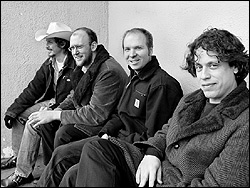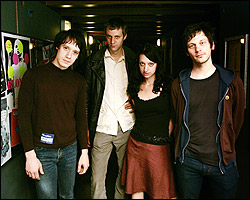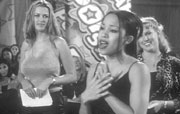Made semifamous by the single “Web in Front” in 1993, Archers of Loaf strapped a sarcastic, stubborn edge onto Chapel Hill’s college rock scene. Because almost no one could match their brand of jerky, disobedient guitars, cantankerous tones, and unexpected melody, they seemed nearly peerless at the time. Archers frontman Eric Bachmann just might be peerless, too. After briefly cocooning himself following the demise of the band near the end of the decade, Bachmann emerged in 2000 as a folksinger with some awfully dark tales to tell and some unusual—at least considering his last band—ways of telling them. With Crooked Fingers, Bachmann and his new bandmates replaced white walls of noise with droning cellos. Instead of biting, breakneck dissertations, they had slow laments. It’s not surprising that these days, Bachmann frequently encounters Archers of Loaf fans who can’t stand Crooked Fingers and Crooked Fingers fans who want to know what the hell that Archers shit was all about. Then again, there are plenty of us who are more than fine with both—and damn happy that in early 2003, Bachmann moved to Seattle. On a recent rainy afternoon, Bachmann sat for the Jukebox in my living room while nursing a tumbler of whiskey.
Meat Puppets: “Lost” (1983) from Meat Puppets II (SST)
Eric Bachmann: OK, sure, I know these guys. I liked them, but I never loved them.
Seattle Weekly: Really? Well, Sonic Youth and the Replacements are typically cited as Archers’ big influences, but I didn’t want to play you anything that easy.
Bachmann: Well, with the Archers, there were four people putting stuff in. It’s very, very probable that Archers would have sounded like what I sound like now if it hadn’t been so collaborative. I really just like songs. Songwriters. The Sonic Youth stuff wasn’t from me, that was from Eric Johnson. Matt [Gentling] didn’t give a shit about Sonic Youth, Mark [Price] didn’t care. He thought they were fine. Eric really, really liked the guitars.
Roy Orbison: “In Dreams” (1963) from In Dreams (Columbia)
Bachmann: I certainly like this guy. My pop listened to 5th Dimension and stuff like that. Steppenwolf. My mom was into country music, Kris Kristofferson, Johnny Cash, Merle Haggard, but probably my favorite things were like Townes Van Zandt records. I mean, I remember liking the Ramones and stuff like that, but it didn’t make me want to write. Bob Dylan made me want to write, but that’s true of everyone, isn’t it? I remember specifically writing “Web in Front,” blatantly trying to rip off Bob Dylan. I wanted it to be all scattered and wordy like “Subterranean Homesick Blues.”
SW: Well, there goes my impression of you as this tough rock guy.
Rick Nelson: “Lonesome Town” (1963) from Best Sellers by Rick Nelson (Imperial)
SW: Then there’s my impression of you as a great voice, whether you’re singing your songs or someone else’s.
Bachmann: Awwww. . . .
SW: No, c’mon, I mean, the way you use your voice in recordings, it’s not like you don’t know.
Bachmann: Yeah, I mean, I wouldn’t sing if I thought it sucked. I believe I can sing. But you never listen to it that way; you only listen to that one Valley-boy way that you sang that lyric and you go fucking A, why did I sing that that way?
SW: Did it take you a while to figure it out? I mean, did you have to figure out that you had this great, velvety, deep voice?
Bachmann: A lot of it just boils down to being young and being insecure about stuff. Like I would have never written a song like “Broken Man” in the Archers because I never would have had the courage to play it in front of people.
SW: And maybe you hadn’t had the experiences to come up with the sentiment behind it, either.
Bachmann: It’s just this weird thing that when you get older, you just don’t give a fuck what anybody has to say. When the Archers came around, there was this community, it was Chapel Hill, there was this thing going on, and it was fun to do. It was all loud and fast and “Here we go!” And about halfway through it, I’m like, why am I bored? I’m doing this and I believe in it, but I’m not satisfied. And then you start looking for the answers, and I don’t think I really realized it until maybe last year, until I moved out of Atlanta. It’s even weird to me; I hear that song and I go, that’s so weird, it’s nothing like Vee Vee or Icky Mettle. It’s weird, but it’s good. It shows a path.
Cat Power: “Red Apples” (2000) from The Covers Record (Matador)
SW: I’m on this Cat Power thing lately, and I’m making people tell me whether or not they like her.
Bachmann: I think she’s a fantastic talent. I think she’s really got a great voice and she’s perfectly aloof. I haven’t seen a great show, but I think her records are great. I played with her once; we didn’t meet really, but some of her band members are old friends of mine. Her voice is so distinctive, and she has that Southern mojo thing. I do have a lot of friends who don’t care for her, though. The thing about the live shows is, if someone has a lot of talent and they’re not bringing it, it’s just frustrating. It’s just silly.
SW: Yeah, I did see her once at the Opera House during Bumbershoot, and it was almost amazing. Kind of annoying, but almost amazing—and part of that was it was the Opera House, too. Anyway, I also picked this song because it’s on her record of covers, and it’s by Bill Callahan.
Bachmann: And they dated. When the Archers broke up, I wasn’t in a great place and my booker set me up to tour-manage Smog. They had just broken up, that was when Knock Knock had just come out and the cover was a big cat with lightning coming out of it and all the songs were about her. I mean, Bill says about eight things a day—he doesn’t say much, so it’s not like I know what happened between them, but I can guess that it wasn’t too good.
The Carter Family: “In the Shadow of the Pines” (1936) from The Decca Sessions Vol. 1 (Catfish)
Bachmann: Oh, see, this is the stuff I like.
SW: I can tell by the way you got quiet.
Bachmann: This is what I listen to at home. What’s so appealing about it is that you can’t boil it down any more. If you’re going to try to do something—whether you want to try to write a book or paint something or make a song—you want it to be the simplest thing it can be, and you want to make it brilliant. You just cut off all the fat and you end up with pure good shit. There’s no [mimics a guitar squeal] on the top, there’s no “Oh, I’m smart, I’m clever.” There’s nothing ironic. It’s just pure as a stream—and they sing nice and sound good, you know?
Sun City Girls: “Uncle Jim” (1984) from Sun City Girls (Placebo)
SW: Not sure if you know these guys. It’s the Sun City Girls.
Bachmann: They’re from here, right?
SW: They’re from Arizona, but they moved here. I have this list in my head, and you’re on it, of all the music folks who have moved to Seattle from other places.
Bachmann: Yeah, it’s got a weird appeal. It has a weird draw. Number one, the most primitive answer is just that it’s so pretty. It’s so clean. And also, I grew up in the southeast, so it’s the polar opposite. If I move from here I’ll move to New York or Spain. What I like about Spain is the culture. Now, certainly there are more violent cultures—Germany or Russia—but in terms of a slow violence, there seems to be a consistent slow violence in Spain. It’s like the whole bullfight thing. Did the Spanish Inquisition happen, did Franco happen because all those kids grew up watching bullfighting? Mexico and Spain, those are the only countries that have real bullfighting anymore. They have them in France and Portugal, but you can’t kill a bull. The animal-rights people will go nuts—as they probably should. But the ranchers in Spain have a good point. They’re going, “Look, these bulls have a fine life, they would probably be extinct if we didn’t have them here.” I read this book called Death and Money in the Afternoon; it’s about the history of bullfighting in Spain. It’s just really interesting to me.
SW: The slow violence, huh?
Bachmann: Yeah, slow violence.
Crooked Fingers plays Crocodile Cafe with the Delgados at 8 p.m. Mon., Nov. 1. $13 adv./$15.








